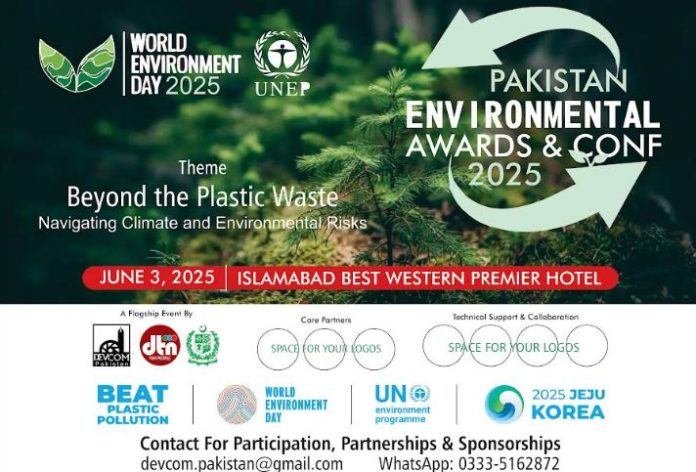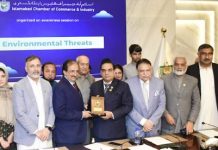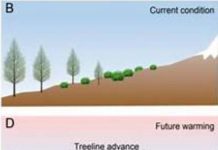ISLAMABAD, MAY 11 /DNA/ – Development Communications Network (Devcom-Pakistan) and partners has scheduled a conference titled “Beyond the Plastic Waste” on June 3 under its annual flagship event “Pakistan Environmental Awards and Conference of Best Practices”. The event marks World Environment Day more meaningfully with a thematic conference and appreciation awards for the good work.
The conference will include the high-level inaugural panel on “Plastic-Waste: From Pollution to Solution”. Other two sessions will focus on “Single-use Plastics: Sustainable Consumption, Production and Alternatives”, and “The Waste Business: 3Rs and Integrated Resource Recycling (IRR)”. The Second Pakistan Environmental Awards will also be conferred upon for some of the best practices promoted under the Corporate Social Responsibility (CSR), Corporate Environmental Compliance (CEC), and environmental conservation projects by the nongovernmental sector. Some individuals and media-persons will also be awarded for their good work.
Devcom-Pakistan Executive Director Munir Ahmed said: “By beating the plastic pollution, together we can create a healthier future for the planet earth. This year’s World Environment Day theme reminds us of our collective responsibility. This year’s World Environment Day comes exactly two months before countries meet again to continue negotiating a global treaty to end plastic pollution. Led by the United Nations Environment Programme (UNEP), and held annually since 1973, it has grown to be the largest global platform for environmental outreach. It is celebrated by millions of people across the world. The Republic of Korea will host World Environment Day 2025 with a focus on ending plastic pollution globally. Ridding the planet of plastic pollution is an important contribution to achieving the Sustainable Development Goals, including those on climate action, sustainable production and consumption, protection of seas and oceans and repairing ecosystems and retaining biodiversity.”
Ahmed said: Plastic pollution permeates every corner of the planet – even in our bodies in the form of microplastics. World Environment Day 2025 calls for collective action to tackle plastic pollution. Pakistan faces a significant challenge with plastic pollution, impacting both its terrestrial and aquatic ecosystems. Annually, the country generates approximately 3.9 million tonnes of plastic waste, with around 70% of this waste being mismanaged—either dumped in open spaces, burned, or ending up in water bodies. A substantial portion of this mismanaged plastic waste finds its way into the Indus River system. Each year, over 164,000 tonnes of plastic waste are transported by the Indus River to the Arabian Sea, posing severe threats to marine ecosystems. Studies have identified the Indus as one of the most plastic-polluted rivers globally, with plastic constituting approximately 40 percent of the total solid waste found in the river and along its banks.”
In response to this escalating crisis, Pakistan has initiated several measures. The government has implemented the Single-Use Plastics (Prohibition) Regulations, 2023, aiming to curb the production and use of single-use plastic items. Additionally, the Living Indus Initiative’ seeks to establish ‘zero plastic waste’ cities along the Indus River, targeting major urban centers like Karachi, Lahore, and Islamabad.
Munir Ahmed said: “Despite these efforts, the effectiveness of such regulations is often hindered by challenges in enforcement and public awareness. The persistent increase in plastic consumption and inadequate waste management infrastructure underscore the need for comprehensive strategies, including public education, improved waste collection systems, and the promotion of sustainable alternatives to plastic. By drawing inspiration from nature and showcasing real-world solutions, the conference will encourage individuals, organizations, industries, and governments to adopt sustainable practices that drive systemic change.” For participation, the interested ones may contact on [email protected].

















